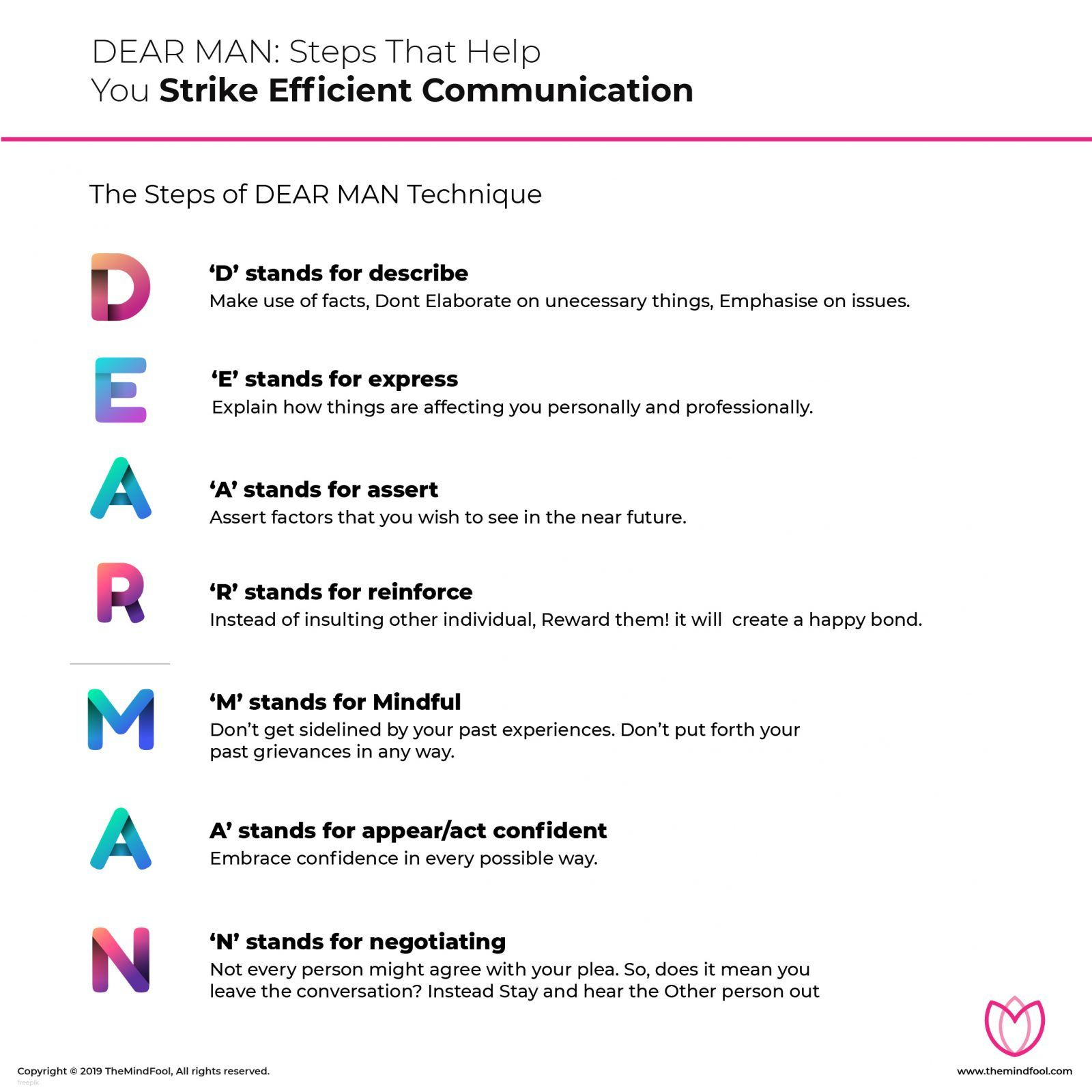Mastering DEAR MAN DBT Worksheet: Simplify Your Emotional Communication

Effective communication can be challenging, especially when emotions run high. Dialectical Behavior Therapy (DBT) offers various tools to enhance interpersonal effectiveness, one of which is the DEAR MAN worksheet. This worksheet is designed to guide individuals through structured dialogues, helping them to assertively express their needs while maintaining respect and understanding. Today, we'll dive deep into mastering the DEAR MAN DBT worksheet to streamline your emotional communication.
Understanding DEAR MAN

DEAR MAN stands for:
- Describe
- Express
- Assert
- Reinforce
- Mindfulness
- Appear
- Negotiate
Each letter represents a step in the process of achieving a desired outcome during a conversation, particularly in situations where you need to request something, set limits, or resolve conflicts.
How to Use the DEAR MAN Worksheet

The DEAR MAN worksheet serves as a step-by-step guide:
Describe

Start by objectively describing the current situation or fact:
- What has happened? Use facts, not judgments or emotions.
- What has the other person done or said?
Express

Here, you express your feelings:
- Tell them how you feel or what you feel about the situation.
- Use “I” statements to convey emotions without blaming.
Assert

Make your request or set your limit:
- Clearly state what you want or what you are willing to tolerate.
- Be specific and direct.
Reinforce

Motivate the person by pointing out positive consequences:
- Explain why this is good for them, you, and the relationship.
- What will they gain from complying with your request?
Mindfulness

Maintain your focus on your goal:
- Stay calm and present during the conversation.
- Ignore distractions and keep returning to the objective.
Appear

Use non-verbal communication effectively:
- Convey confidence through your body language, eye contact, and tone of voice.
- Avoid aggressive or overly submissive postures.
Negotiate

Be open to finding common ground:
- Show willingness to hear their side or offer alternatives.
- Be prepared to give something to get something.
Practical Tips for Using DEAR MAN

- Write down your thoughts using the DEAR MAN framework before having the conversation. This helps organize your thoughts and ensure all points are covered.
- Practice the conversation, possibly with a therapist or a trusted friend, to get feedback on how you can improve.
- Be prepared for different outcomes; not all negotiations will go exactly as planned.
- Remember that it’s okay to revisit the conversation if the initial attempt doesn’t yield the desired result.
🤔 Note: Flexibility in negotiation is key. Sometimes, achieving part of what you want is better than nothing.
Common Pitfalls and How to Avoid Them

Getting Emotional

While expressing emotions is part of the DEAR MAN technique, allowing them to overrun the conversation can lead to derailment:
- Practice mindfulness techniques to stay grounded.
- Take breaks if necessary to regain composure.
Being Too Confrontational

Your assertiveness can come across as aggression:
- Use a calm and even tone of voice.
- Focus on the behavior or situation, not the person.
Not Listening to the Other Person

Effective communication is a two-way street:
- Show that you’re listening by acknowledging their points.
- Ask questions to clarify their perspective.
💡 Note: Remember, the goal is to resolve conflicts and meet needs, not to win an argument.
Mastering the Art of Negotiation

Here’s how you can refine your negotiation skills within the DEAR MAN framework:
| Step | Action | Tips |
|---|---|---|
| Describe | State facts objectively. | Keep it brief and clear. Avoid interpretations or assumptions. |
| Express | Convey your emotions. | Use “I feel” statements to express without blaming. |
| Assert | Clearly state your request or limit. | Be concise, yet respectful. |
| Reinforce | Highlight the benefits for them. | Focus on mutual benefits to encourage agreement. |
| Mindfulness | Stay focused. | Use grounding techniques if your mind wanders. |
| Appear | Convey confidence through body language. | Remember, non-verbal cues can speak louder than words. |
| Negotiate | Be open to compromise. | Be ready to offer alternatives or adjust your expectations. |

Recap and Key Takeaways

Mastering the DEAR MAN DBT worksheet can significantly improve how you navigate conversations fraught with emotional complexities. Here are the crucial points to remember:
- Use each component of DEAR MAN systematically to structure your communication.
- Practice and prepare before entering into significant conversations.
- Stay mindful and present, focusing on the goal without getting overly emotional.
- Be prepared to negotiate and compromise for mutual benefit.
The DEAR MAN technique not only aids in making requests or setting limits but also in fostering healthier, more effective interpersonal relationships. By following these steps, you can express your needs clearly, respectfully, and with an increased chance of positive outcomes.
Can DEAR MAN be used in professional settings?
+Absolutely. DEAR MAN is versatile and can help you communicate more effectively with colleagues, superiors, or clients to assert your needs, negotiate terms, or resolve conflicts.
What if the other person doesn’t respond positively to my DEAR MAN approach?
+Not every conversation will go as planned. Be prepared to revisit the conversation or consider if your expectations are realistic. Remember, it’s about finding a middle ground, not always winning your case.
How often should I use the DEAR MAN technique?
+Use DEAR MAN whenever you need to assert your needs, set boundaries, or resolve a conflict. With practice, it becomes more intuitive, allowing you to incorporate it into your daily interactions as needed.
Can DEAR MAN help with personal growth?
+Yes, by improving your communication skills through DEAR MAN, you’ll grow personally as you learn to express yourself assertively and understand others better, leading to stronger personal relationships.